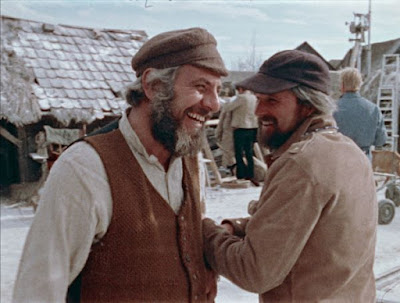Fiddler's Journey to the Big Screen
Directed by Daniel Raim
Released by Zeitgeist Films in association with Kino Lorber
 |
| Actor Topol and director Norman Jewison on the set of Fiddler on the Roof |
There’s a priceless moment late in Fiddler’s Journey to the Big Screen, Daniel Raim’s absorbing documentary about how one of the most popular musicals in Broadway history, Fiddler on the Roof, was transformed into a hit Best Picture Oscar nominee upon its release in 1971.
The movie’s director, Norman Jewison, describes watching his film at its Israeli premiere, sitting next to then-prime minster Golda Meir. She sat stoically during the screening, Jewison says, until near the end of the screening, after the song “Anatevka,” named for the setting, a village from which the Jewish inhabitants are forcibly evicted in a 1905 Russian pogrom. “I was watching her, and I saw [he gestures with his hand to his face] … she didn’t want me to see that she was crying,” he says, still visibly moved a half century later. “And then she just put her hand out and squeezed my arm … that was like a blessing, and it meant a great deal to me.”
Jewison is front and center here. Raim features a recent Jewison interview as well as several others from the preceding 50 years as the filmmaker engagingly discusses everything from his career (he began in television) to why he cast Topol in the lead. (Zero Mostel, who originated the part of Tevye on Broadway, was, Jewison felt, too boisterous and too American.) The director also talks about not being Jewish, despite—as he says—his name. When he was growing up in Toronto, people assume that he was the “son of a Jew.”
Narrated by Jeff Goldblum, the documentary at times has the feel of one of those retrospective features that are included on DVD or Blu-ray releases of classic films: new and archival interviews with the principal cast and creators, on-set and behind-the-scenes footage, and experts and scholars opining on said film’s importance and legacy.
All that is present and accounted for, but Raim’s film is also a personal journey. There is also something quite touching about three of the actresses who played Tevye’s daughters—Rosalind Harris (Tzeitel), Michele Marsh (Hodel), and Neva Small (Chava), interviewed separately—reminiscing about making the film and charmingly breaking into song.
There are other wonderful vignettes related to the music from lyricist Sheldon Harnick and John Williams, conductor and arranger of Jerry Bock’s original score, who discusses violinist Isaac Stern performing the title character’s yearning solos and how they related to artist Marc Chagall’s famous paintings—which also influenced how Jerome Robbins staged and Boris Aronson designed the original 1964 Broadway production.
Critic Kenneth Turan points to something important about the movie and its legacy: It’s a film about a people and a country, the Russian Empire, that don’t exist anymore, just like the place where it was filmed, the former Yugoslavia. This tracks with the musical’s theme, as Turan sees it, that “Nothing is permanent.”
The irony is that Fiddler on the Roof is obviously still here, permanently etched in the memories of the artists who worked on it, like Oswald Morris, who deservedly won the Oscar for his dazzling cinematography, and is seen in vintage clips describing how he came up with several of its many memorable shots. There are also the legions of Fiddler viewers worldwide. Topol, in an interview from 2009, says, with perhaps Tevye-like exaggeration, that more than a billion people had seen it since its release. Whatever the numbers, they will likely continue to grow.
originally posted on FilmForward.com
No comments:
Post a Comment